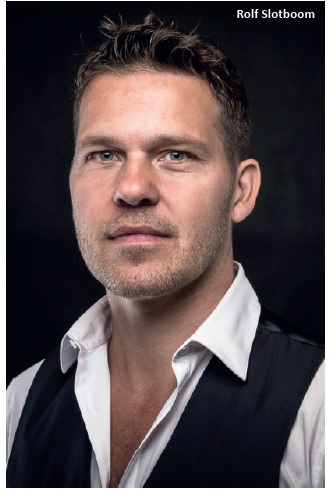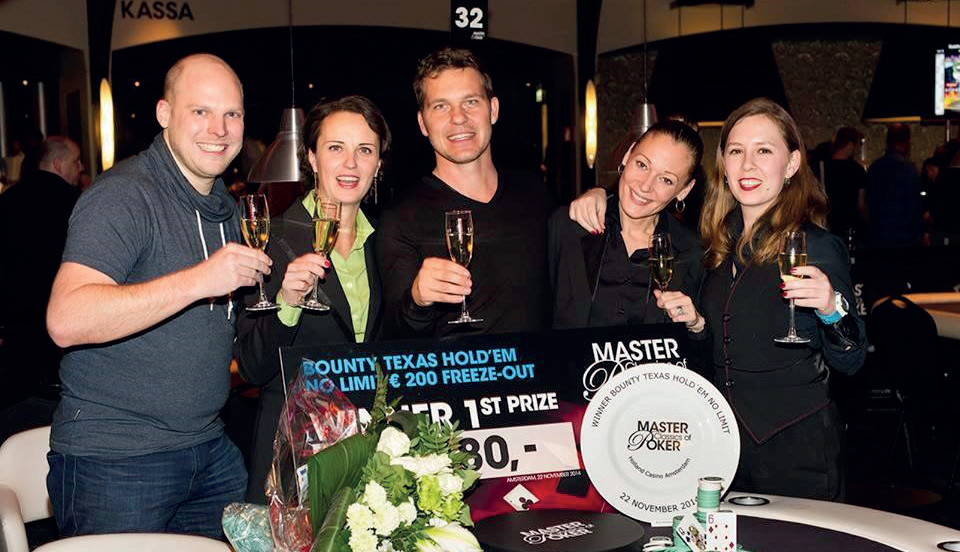Rolf Slotboom, Communicatie KNBB, Beleid & Strategie Centrum voor Verantwoord Spelen, Woordvoerder PokerBond chats to Peter White
Former poker pro Rolf Slotboom, now involved at the Center of Responsible Gaming, on the importance of prevention and earlydetection of problematic gambling. 2002: Columnist @ Card Player 2004: Teacher @ Poker School Online 2005: Dutch Poker Champion 2006: Bureau Chief @ Card Player Europe 2006: Poker commentator @ Eurosport 2008: Author “Secrets of Professional Pot-Limit Omaha” @ D&B Publishing 2011: Spokesperson @ Dutch Poker Federation 2014: Marketing manager @ Center of Responsible Gaming 2015:Project leader @ Ik Ben KOA (player platform regulation online games of chance)
Can we start with an introduction to the Center of Responsible Gaming?
Center of Responsible Gaming was founded by Yvon Jansma as a low-entry hub for players, with as main goals: prevention and early-detection of problematic gambling. In recent years, we have contributed to the goal of online regulation, given that online play is still not legal in the Netherlands. We have developed the responsible gaming app ‘Bet.ter’, we have tried to raise awareness for responsible gaming both with players, operators and with politicians, and we have hosted expert meetings on various subjects, oftentimes on protecting vulnerable groups like youth and adolescents. Or, on the recurring issue of a player’s own responsibility versus the operator’s duty of care: where does one end, and where does the other begin?
Define your role at the organisation
I joined three years ago. Given my background in communication, I was handed the title ‘Marketing Manager’. But because this didn’t really cover what I was doing, my official job description is now: ‘Policy, Communication & Strategy’. I am responsible for the website, for our social media, for ‘tone of voice’ and for finetuning our strategic goals. But basically, Yvon and I who do almost all things together regardless of roles and titles. Three key aspects include: contacts with players, contacts with representatives from politics or addiction care, and taking care of our projects – for instance the project “Information Package Online Gambling Addiction” subsidized by the Ministry of Security & Justice, or projects with the help of the trade organisation of online operators like the development of Bet.ter, the first-ever responsible gaming app in the Netherland. Our motto: be there where the players are – and this means that, as small as our organization is, we are basically everywhere.
How does expertise gained from your previous roles in media relations assist you in your role?
It helps in many ways. Given that we try to connect between three key stakeholders (players, politicians and addiction care) we need to make sure that we speak all of those languages well. Or, perhaps phrased more accurately: players need to know that we understand them, that we understand why they sometimes enjoy playing, and that not all gaming and gambling is bad. When talking to politicians, another different tone of voice is needed, yet with at all times the interests of players at heart. After all, they need to be protected by law, and for way too many years and especially for online players, this is simply not the case. My communication expertise (former Bureau Chief at CardPlayer Europe, poker commentator at Eurosport, columnist and published author) is of course crucial. But just as importantly: my background as a player. Having been a good and successful poker player for many years, players know that the Center of Responsible Gaming doesn’t judge. We don’t think all gambling is bad, as it can be highly enjoyable, especially games with a skill factor like sports betting, poker and eSports that can be mentally challenging and rewarding. By providing tips to players on how to gamble responsibly, and by training casino employees how to detect (potentially) problematic behaviour, we aim to give players a bit more help and guidance. Especially recreational players who are on the verge of becoming at-risk players; our aim is to provide them with easy-to-implement information, help and guidance so that they never turn into at-risk players.
In all honesty, this expertise of mine is useful for one reason only: that it is combined with the expertise of Yvon Jansma. Her many years of experience in addiction care and my experience in gambling and writing about gambling is what I would call ‘synergy’, the creation of a whole that is greater than the simple sum of its parts. More than anything because we genuinely care, and because we don’t mind working hard.
Do you think television broadcasters that earn money from betting organisations should contribute to charities involved with helping addicted gamblers?

We firmly belief that not all, but definitely a lot of operators are genuine in their efforts to ‘do the right thing’ and to protect their customers. If they can show their good will by contributing to these kinds of charities, this could be beneficial to everyone
involved, regardless of whether these contributions are obligatory or voluntary. In the Netherlands, there will be an Addiction Prevention Fund that is funded by both online and landbased operators. I will leave it up to politicians whether in addition to
these contributions by operators there should also be contributions from ‘indirect’ sources like the one you mention. If television or online broadcasters could come up with a way to voluntarily contribute, this would be great – especially from a social responsibility point of view.
If I had a gambling problem I would have to:- Stop having a phone - Stop using my iPad - Stop watching Television – Stop using my PC – Stop listening to commercial radio - Stop going to the town centre, Stop driving in my car for billboards showing sporting events that are sponsor promoted – Stop reading newspapers. Some would say that’s like being in Prison. How is anyone who has gambling addiction in this modern-day society ever able to stop?
You are right. Because of the number of devices and opportunities to gamble, it is harder now than before the online era to steer away from gambling. Gambling is everywhere! Therefore, our efforts are on responsible gaming, and trying to intervene before recreational players have turned into at-risk players or even problem gamblers. This way, we hope that despite all these, possibly enticing, opportunities to gamble, the vast majority of players choose do so in a responsible manner.

On that point shouldn’t event organisers who gain sponsors from the betting industry also make contributions to charities involved in the care and treatment of addicted gamblers?
As I have already said, we firmly belief that not all, but definitely a lot of operators are genuine in their efforts to ‘do the right thing’ and to protect their customers. If they can show their good will by contributing to these kinds of charities, this could be
beneficial to everyone involved, regardless of whether these contributions are obligatory or voluntary. And, if event organisers, television broadcasters etc. can follow suit, so much the better. In the Netherlands, there will be an Addiction Prevention Fund that is funded by online operators, and the broader the financial support, the better. So yes, funding of charities involved in the care and treatment of addicted gamblers is very important, and any way to accomplish this is one that I would welcome. Having said that, in quite a few countries care and treatment of addicted gamblers is already taken care of quite well, oftentimes through insurance companies. Yet, prevention of gambling addiction isn’t always given the same kind of (also, financial) priority. At the Center of Responsible Gaming we think a lot of time, effort and money from all parties involved (operators, politicians, society as a whole) should be on prevention and early-detection: provide players with the right information at the right time, and assist them in finding the help they need in case they have developed the beginnings of a gambling problem. Prevention is always better! www.rolfslotboom.com www.centrumvoorverantwoordspelen.nl www.betterapp.nl
Peter White In addition to his role as Publisher of Casino Life and Bingo Life, Peter also undertakes interviews with  leading Casino operators. He has travelled extensively over the course of 17 years, visiting Casinos World Wide as well as attending the leading gaming industry exhibitions and conferences. Peter is also Vice President, International Operations for leading US based Gaming industry consultancy, WhiteSand Gaming LLC and a Director at Screentrade Media Ltd, a leading International Publisher specialising in the Cinema Industry.
leading Casino operators. He has travelled extensively over the course of 17 years, visiting Casinos World Wide as well as attending the leading gaming industry exhibitions and conferences. Peter is also Vice President, International Operations for leading US based Gaming industry consultancy, WhiteSand Gaming LLC and a Director at Screentrade Media Ltd, a leading International Publisher specialising in the Cinema Industry.
 leading Casino operators. He has travelled extensively over the course of 17 years, visiting Casinos World Wide as well as attending the leading gaming industry exhibitions and conferences. Peter is also Vice President, International Operations for leading US based Gaming industry consultancy, WhiteSand Gaming LLC and a Director at Screentrade Media Ltd, a leading International Publisher specialising in the Cinema Industry.
leading Casino operators. He has travelled extensively over the course of 17 years, visiting Casinos World Wide as well as attending the leading gaming industry exhibitions and conferences. Peter is also Vice President, International Operations for leading US based Gaming industry consultancy, WhiteSand Gaming LLC and a Director at Screentrade Media Ltd, a leading International Publisher specialising in the Cinema Industry.
















